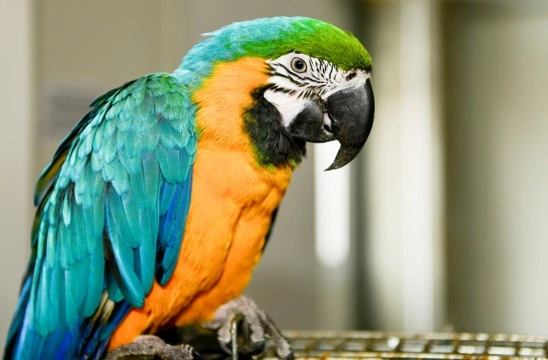
What is Pacheco's Disease and How Does it Affect Pet Birds?
Keeping birds either as indoor pets or in an outside aviary can be very rewarding. Whether you have a parrot or a cage full of canaries, the colour and vibrancy our feathered friends add to a home, is quite lovely. However, parrots can be a little noisy when they want to be as can many other species of birds. Making sure birds are in fine fettle is essential which means creating a nice environment for them to live in. It's also crucial for them to be fed a diet that suits their species and to keep an eye on them so illnesses and diseases can be picked up earlier rather than later.
With this said, many species of birds seem in perfect health only to suddenly drop dead without owners ever really knowing what happened or what disease or illness struck their birds down which can be very distressing. One disease that's highly infectious and quite deadly to birds and more especially to Parrots, is Pacheco's disease. It is spread from bird to bird very quickly via their faeces, nasal discharge and from contaminated surfaces in their environments.
More often than not, when a bird is infected with Herpesvirus they may or they may not show any symptoms but typically die a few days after being infected which can be very confusing for owners. One day their pets are fine and a few days later they find them dead without having shown any signs of being ill at all. However, if a bird does show symptoms, these usually include the following:
- Faeces are green in colour – this is due to the bird's liver being damaged by the disease
- Birds are listless
- Diarrhoea
- A nasal discharge
- No appetite
- Red eyes
- Swellings
- Tremors
- Seizures
- Feathers are ruffled – birds appear cold
- Death within 48 hours of being infected with the herpesvirus
The first signs, if there are any, that a bird is infected with Pacheco's Disease start to show around 3 to 7 days of them being infected. However, as previous mentioned not all birds demonstrate any symptoms of being ill.
What Causes Pacheco's Disease
This nasty disease is typically caused by the Herpesvirus which birds get from the nasal discharge and faeces of other birds that have been infected by the virus. However, the disease is spread through feather dust, food, water, perches and dander which all help it go from bird to bird at a rapid pace. With this said, birds that have lost their mates, been relocated, been subjected to a change in temperature and climate as well as other emotional and climate changes, have been seen to contract Pacheco's Disease which means these can trigger the disease.
Bird owners should also note that the herpesvirus is able to survive for a very long time outside a bird's body which in short, means that a bird can catch the disease from a contaminated surface like a perch or any other surface found in their environment.
Treating Pacheco's Disease
If a bird does show any symptoms of the disease and a vet is able to diagnose the condition very rapidly, they would typically prescribe Acyclovir as a treatment but with this said, this particular medication does cause kidney damage and only really works if birds are treated in the early stages of an infection generally before any symptoms actually show themselves. In short, it can be very difficult to treat infected birds.
Can You Prevent Birds From Contracting the Disease?
Birds that have contracted Pacheco's Disease and been successfully treated, can suffer from the condition further down the line because the herpesvirus could be triggered if they get stressed out. As such, it is crucial that any bird that's suspected of having the virus is quarantined for a minimum 1 to 2 months so the disease does not spread to any other birds that live in the same environment.
The next crucial thing that needs doing is to remove all birds from their environment so that you can treat and disinfect all the contaminated surfaces using a strong disinfectant that contains an oxidiser namely chlorine bleach. You should discuss this with your vetwho may be able to recommend a stronger disinfectant to ensure the virus is effectively killed off.
The best way to ensure this nasty and fatal disease does not take hold is to have them regularly tested. There is a vaccination available which is a 2 dose injection administered to infected birds at 4 week intervals. After that, birds need to have an annual booster. There's a downside to this vaccines which are the side effects it carries with the risk of granulomas forming where the injection has been administered and some birds have suffered paralysis following a vaccination. Therefore, it is recommended that only high risk birds should be vaccinated.
Conclusion
Pacheco's Disease is a highly infectious and fatal condition that affects birds and more especially those from the parrot family. Sadly, all too often birds don't even show any symptoms and die within a few days of contracting the herpesvirus which is very distressing for their owners. There is a vaccine available but vets recommend this only be given to birds that are most at risk because of the nasty side-effects associated with it. Birds need to be regularly checked by a vet so that if they are infected, they can be quarantined and treated with the right medication. If a bird does survive, any stressful situation may well trigger the disease to take hold again which means more damage is done to a bird's organs which is pretty severe and permanent.



